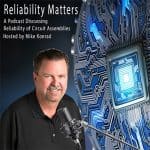
Planning: Parts Acquisition
Bringing value to you through training and education, taking an in depth look at all things Reliability.
[Read more…]
Your Reliability Engineering Professional Development Site
by George Williams Leave a Comment

Bringing value to you through training and education, taking an in depth look at all things Reliability.
[Read more…]
by James Kovacevic Leave a Comment

Distance learning is becoming more trendy in the industry and is preferred by a lot of students especially the ones doing their Masters. The biggest reason that the students choose distance learning over traditional learning is because of the flexibility of the process. Due to this supreme advantage, anyone can get into an online course. It is particularly very advantageous for people who have jobs or need to take care of their families. It is really good for the parents who have limited time and need flexible study hours which distance learning provides. The institutions are becoming more inclined towards it these days.
In this episode, we covered:
by Mike Konrad Leave a Comment

Dr. Craig Hillman speaks about designing for reliability. Electronics for space and automotive applications are discussed.
by Robert Kalwarowsky Leave a Comment

This week, I welcome my good friend Devin Luquist to the show. Most of you won’t know Devin but he’s a chemical engineer who has worked in oil & gas for the last 7 years before starting his own artificial intelligence company, Woven Cognition. Devin and I went to MIT, played on the varsity water polo team, were fraternity brothers and took economics courses together. In the episode, we take a deeper look at risk, decision-making and uncertainty. We give you some ideas on how to take risk into your decisions, how to deal with variance and introduce expected value.
If you enjoy the show, please tell your colleagues in reliability about it and follow Rob’s Reliability Project on LinkedIn. I’m putting out some bonus content only for that page so if you follow my personal LinkedIn, you might miss out on some great stuff.
If you have any questions, business inquiries or if you’d like to appear on the podcast, email me at robsreliabilityproject@gmail.com
Follow Devin Luquist on LinkedIn – https://www.linkedin.com/in/devinluquist
If you have any questions for Devin Luquist – dluquist@wovencog.com
Follow Rob’s Reliability Project on LinkedIn – https://www.linkedin.com/company/robsreliabilityproject/
Follow Rob’s Reliability Project on Facebook – https://www.facebook.com/robsreliabilityproject/
by Christopher Jackson 2 Comments

Chris and Fred discuss the new challenges of reliability in the upcoming years. Accendo was originally setup to help reliability professionals in an objective and broad forum. And this appeared to fill a void. Trade magazines are over-bearing, with sponsor adds replacing well thought-out articles. Professional societies are becoming less and less relevant (but more expensive). And Accendo lists ‘competitor’ programs, blogs and articles where other organizations strictly focus on their products, courses, books and so on. So Accendo has become the only ‘one stop shop’ for the reliability engineering community who want to develop their skills.
by James Kovacevic Leave a Comment

James and Fred discussing the many ways to learn while at a conference.
ᐅ Play Episode
by Mike Konrad Leave a Comment

With the rapid expansion of IOT, many circuit assemblies are now functioning in unfamiliar environments, many of these environments are harsh. Additionally, many new electronic applications control critical systems such as automotive electronics. This webinar focuses on the influence contamination plays on reliability of circuit assemblies, particularly when operated in harsh environments.
Several contamination-related failure mechanisms are presented including electro-chemical migration (dendritic growth, parasitic leakage) and conductive anodic filament (CAF). Methods to determine how clean is clean enough are discussed.
by George Williams Leave a Comment

Tonight we continue our series on Planning and Scheduling. Our discussion is on Estimations on Work Orders. Tune in, download, and subscribe! [Read more…]
by James Kovacevic Leave a Comment

Seals are very important to contain machine fluids and keep them from different sort of contamination. There are different types of seals in the market such as traditional packing, mechanical seals, air seals, and other seals that keep bearing hoses in check. Traditional packing is one of the cheapest sealing solutions out there in the market. The only difference between a mechanical seal and packing is that the mechanical seals work very well for the rotating piece of equipment. They give precision and accuracy where is needed as compared to the traditional packing where there are a lot more chances of errors while holding the fluids in.
In this episode, we covered:
by Robert Kalwarowsky Leave a Comment

On this week’s episode, I welcome Adrian Messer from UE Systems to the show. We talk more about how to use ultrasound as a predictive maintenance tool and different mechanical faults that you can detect. We also dive into some of the nuts and bolts of setting up an ultrasound program including where, how often to take readings and procedures.
If you enjoy the show, please tell your colleagues in reliability about it and follow Rob’s Reliability Project on LinkedIn. I’m putting out some bonus content only for that page so if you follow my personal LinkedIn, you might miss out on some great stuff.
If you have any questions, business inquiries or if you’d like to appear on the podcast, email me at robsreliabilityproject@gmail.com
Check out UE Systems – uesystems.com
Follow Adrian Messer on LinkedIn – https://www.linkedin.com/in/adrianmesser/
Follow Rob’s Reliability Project on LinkedIn – https://www.linkedin.com/company/robsreliabilityproject/
Follow Rob’s Reliability Project on Facebook – https://www.facebook.com/robsreliabilityproject/
by Adam Bahret Leave a Comment

Adam and Fred discussing a new concept to test products to their limit.
ᐅ Play Episode
by Fred Schenkelberg Leave a Comment

As a reliability professional, you will be asked to teach. You are part teacher, coach, mentor, and expert. Being effective enhances the understanding of reliability objectives and methods to achieve them. Let’s explore becoming an amazing teacher. [Read more…]
by Christopher Jackson Leave a Comment

Chris and Carl discussing how the self discipline of taking care of personal “tidiness” can be applied to improve the organization of reliability activities.
ᐅ Play Episode

Changing a customer’s mindset is often difficult. When a process is working well, we often resist changing the process, even if the change provides a better result. This is the “Good is the Enemy of Great” syndrome. My guest, Wendy Casker of Johns Hopkins Applied Physics Laboratory tells of us how she introduced a “better process” to her space customer.
by James Kovacevic Leave a Comment

Asset hierarchy is very important to utilize the limited resources of an organization in the best way possible. It helps manage time and cost by prioritizing our assets. That’s why every organization needs to have a hierarchy. There are a lot of standards out there to help you build an asset hierarchy. ISO 14224 helps greatly in the matter. It contains guidelines that a maintenance and reliability organization can use to define some sort of organized processes and procedures that are important to have in the facilities. When they have laid out a foundation that way, it gets easier to do all sorts of things.
In this episode, we covered:
 Ask a question or send along a comment.
Please login to view and use the contact form.
Ask a question or send along a comment.
Please login to view and use the contact form.